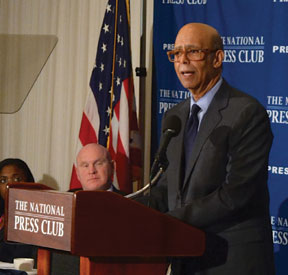

UNCF: A mind is ‘a wonderful thing to invest in’
By Jazelle Hunt NNPA Washington Correspondent
WASHINGTON, D.C. (NNPA) – For the first time in 42 years, the United Negro College Fund has altered its signature phrase. Now, a mind is not only “a terrible thing to waste,” but “a wonderful thing to invest in.”
The change is part of a UNCF’s campaign to provide emergency support in the face of a financial aid crisis facing Historically Black Colleges and Universities and their students. UNCF President Michael Lomax selected the National Press Club as the venue to call for renewed financial support for the 37 HBCU member institutions.
“Today our member schools are facing a financial crisis as severe as any in UNCF history,” Lomax said. “The irony of this situation is that the financial crisis comes at a time when interest by African American high school students in attending HBCUs has been on the rise for over a decade.”
Between 2001 and 2013, UNCF member private colleges have seen a 78 percent rise in applications. But this rise in interest, plus lack of funds for scholarships and increased need among families who are just now recovering from the recession, have converged to form a perfect storm that threatens students’ ability to attend.
In his remarks, Lomax condemned recent changes to the Direct PLUS loan as one of the largest stumbling blocks for current and aspiring HBCU students. The Direct PLUS loan is a low-interest, credit-based, federal loan for parents to fund their children’s college education. The newly-required credit check bars only those with significant “adverse” credit issues, such as a tax lien, home foreclosure, or 90-day-late debt payment. The PLUS loan was particularly beneficial to families of color with little to no credit, as well as those with too much income to qualify for need-based aid, but too little to foot the bill.
In October 2011, the Department of Education toughened its definition of adverse credit, in response to an internal report warning against granting loans to those who may be incapable of repaying them. Now, parents with any accounts in collection within the last five years; any unpaid collection accounts (ever); any loan defaults, (ever, even if the claim has been paid); and any defaulted contracts or leases, are ineligible for a Direct PLUS loan.
Consequently, many Black colleges are complaining that they are losing students who otherwise would be on campus.
Parents and colleges were neither consulted during decision-making, nor informed of these changes in advance. Many families who had been initially awarded funds for the 2011-2012 school year were surprised to find themselves suddenly no longer eligible for the 2012-2013 year.
“We were blindsided by the changes that, literally, from one day to the next, made many thousands of these parents ineligible for parent PLUS loans,” Lomax said. “The impact on students who depended on PLUS loans was immediate, and devastating. Many who arrived at their college dorms after summer break, in fall 2012, were literally turned away at door.”
According to Lomax, approximately 28,000 HBCU students were affected, accounting for more than half the PLUS loan denials that school year. UNCF member schools reported a $155 million loss in revenue. As a result of public outcry, largely led by HBCUs and the Congressional Black Caucus, the Department of Education pledged a review of its credit requirements, and established a process for parents to appeal their loss of eligibility.
In the meantime, there is not enough money to go around among private aid organizations. UNCF, for example, has raised $3.6 billion in it existence to send more than 400,000 students to college. But for every student it awards today, nine more applicants are denied.
Those who are awarded are likelier to graduate, compared to African Americans students in general. According to a report, “Building Better Futures: The Value of the UNCF Investment,” 70 percent of UNCF scholarship awardees in 2006 were likely to graduate within six years.
Lomax elaborated, “The [national] six-year graduation rate for African Americans is 40 percent. If we could increase that rate by just 7 percentage points, we would graduate close to 16,000 more African Americans with bachelor’s degrees each year.”
Additionally, 94 percent of African American freshman who were awarded loans in 2006 re-enrolled the following year. Nationally, the retention rate was 78 percent for all students.
In addition to scholarships for Black students, HBCUs themselves are also valuable. African American students, particularly first generation and low-income students, tend to view HBCUs as a more affordable and more welcoming option for quality higher education. On average, tuition at UNCF member HBCUs is 30 percent less than that of comparable institutions.
And there are more intrinsic draws, Lomax said.
“First, [high school students] say [HBCUs] feel like home – they feel like family. Second, they believe HBCUs will help them explore themselves as an individual, rather than as a statistic. And finally, at an HBCU, they feel they can learn more about where they come from,” he explained. “This is a powerful set of motivations…but desire and high motivation however, are not the same as scholarship funding.”
Lomax also discussed the preparation level of today’s incoming freshmen, the value (and lack thereof) of for-profit colleges, and the balance between trade schools and college.
Reps. John Lewis (D-Ga.) and Danny Davis (D-Ill.) were also in attendance at the National Press Club event. Both Congressmen are HBCU alums, and took the opportunity to speak in support of renewed investment.
“If it hadn’t been for these colleges and universities, I wouldn’t be standing here today,” Lewis stated. “Without these colleges and universities, we wouldn’t have a modern-day Civil Rights Movement. These colleges and universities bring about a non-violent revolution, a revolution of values, a revolution of ideas.”


Be the first to comment